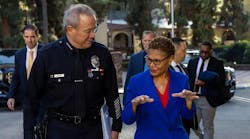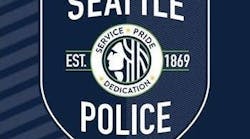Having had several telephone conversations with readers regarding the hiring process, I promised one new officer that I would share the advice with others. If you are in your first job search (entry level or even chief), promotional or intradepartmental special unit, you will have some kind of interview process. Matters not if you are good at this or not, it is a reality of life. You will have to go face to face, there are no apps, or texting – you have got to look’em in the eyes. Now, having been on both sides of the table, there are some hard truths that you must understand before facing the dais. This could for some be the hardest part of the process and for several - the exit ramp from a dream job.
Know Before You Go
Matters not what kind of process you are in, there is a process or a roadmap to this journey. First, thoroughly read the job posting and do some research into the process and its projected timelines. Every organization will have a time-line for their process and it should be posted or shared with you. Look for wording such as ‘starting a Spring 2018 Academy class’ or ‘starting date April 1, 2018’as clues. A job vacancy is built on budgetary planning, you could get a conditional appointment but no official start date until then (or when it is funded). You must get it into your head, you are not the only one that they are processing. Depending on the job, the applicant pool can be hundreds deep to a handful. Know the odds that you are dealing with as well.
One suggestion I offer is that for every job or promotion you have applied for create a note sheet with a flow chart or timeline. Make note of the application cut-off date for you rarely hear anything until this passes. Some may post a review date - this is where all of the applications will be reviewed by human resources departments, by hiring agencies or civil service panels. Then and only then will you progress to the next step. Fully research each process for the flow chart part of your notes. You can be in the same state and there will be different process as for example - a municipal government can have a very distinctive process, than that of a county or state government process. Keep notes on your calendar on when your responses are due. One case I note is where a department sent an in-depth interrogatory questionnaire for the background process to be returned with a specified number of days. All responses received after the suspension date would be rejected, care to ask what happened? Your failure to plan does not create an emergency on their level. Besides, if you procrastinated now, your past and current performance is a predictor of future performance. Pay attention to requests and time lines listed for you to complete.
On your note sheet denote all interactions with the staff regarding this position. If they say to call after the 15th of the month, write down who advised you of this and when, then call after the 15th and note the responses. Note and keep copy of your emails and messages. So many applications now are on on-line and several have Apps for the process it easy and they avoid human contact. Pay attention to notes and messages and from whom. Larger agencies may have several working a process. If you are asked why you did something, you will have a name to respond with, not ‘some guy’ called me. Notes are critical to success, sometimes mistakes are made, you may create your opportunities.
Why Do You Interview?
I get this question more than you can count! I have said in the past, the job description for a police officer is a “human service provider”. You can condense all of the multi-pages of human resources and civil service job requirements and desired traits into these three words. Before the investment is made into you getting the job and representing the agency, the agency has the right and need to ‘kick your tires’ so to speak. If we were hiring droids, all we need is the programming and software certificates. Agencies want to see how you are wired.
Take for granted everyone that has made it this far in a process. All have the same educational requirements, credentials, and so forth completed. What separates you from the crowd? Your oral skills and interpersonal communication skills may be the difference in your getting hired. How well you respond to personality based questions allows the reviewers to see what makes you tick. Sometimes hard, pointed questions that could shake you may fly and how you stand up to the questioning is important. Aren’t you seeking a job that requires your steady testimony in court or handling contentious situations with citizens required? If you cannot handle the interview heat here, how will you respond under true, real-world pressure? How to respond in an oral interview is an entirely whole conversation for another day. My advice to you now is to practice, no sitting on the sofa but before another person who is willing to practice grilling you with the real questions. Have real practice sessions, wear the coat & tie, practice sitting in the hard chair facing it, not from the easy chair. The more you practice the easier it can become for you. I do not want the first big interview disaster to have been your dream job. Research and get polished.
You could have to complete a telephone or internet interview, not uncommon in the civilian world. It saves money and time for all. These can be tricky, telephone interviews you have no feedback except audio. The camera interviews, the only feedback may be to the one asking the questions, no group feedback. Tips for these are to be totally prepared. Allot more time than required, could last longer than expected. Have a couple bottles of water handy to prevent dry mouth on long interviews. Get all distractions out of the area. Cut off the other phones, noises and get the dog and kids out of the house, your focus should be this interview only.
Interview tip is to never let them see you are rattled or offended. Turn off your emotion meter! It is not personal, it is business. Their job is to question and test your mettle, your job is stand up and face it with your best responses. You want that job- prove it!
Too Many Apps
The technology of job applications has totally changed the face of recruiting. Yes, you can electronically sign, attach resumes, certifications and even complete some on-line testing in some places. As much as I hate to say it, the older way of producing applications and interacting with staff was a good measure of an applicant and organization back then, that too is fading away. As we seek candidates from across the internet we have adjusted but it does prove you can interact electronically. Interviews, this is where we press the communication button to overload. You cannot do these via a text and no app is going to get you the job, if is all on you. Interviews, we can all agree that most of us hate them but they are performance measure with a skilled interview team. How you prepare and respond during the interview can be the ultimate key to success. Do not dread it, prepare for it.


